How To Grow Food On Mars
Over the past few weeks, we’ve been highlighting schools nationwide that exemplify the ethos of the Ministry of Education’s More Campaign. This week took us on a trip to Belize River Valley, where King’s College has captured our attention. We discovered a testament to creativity and innovation. Students set out to demonstrate a solution that the world has been discussing, a doomsday event. An out-of-this-world alternative where civilization can exist. Is Mars habitable? Would we be able to produce food on this planet? These are just some of the questions for which we are still gathering scientific evidence to support the future likelihood of life beyond Earth. It takes in-depth research, and we never expected to get some answers from a class of students at King’s College. Illustrating their ingenuity and forward-thinking mindset, lets just say… their presentation was “out of this world’. Sabreena Daly tells us more.
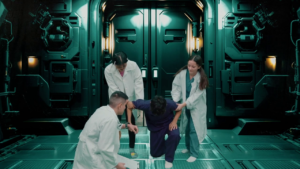
Voice of: Martian King
Voice of: Martian King, Student Narrator
“In the not so distant future, humanity had set its sights on the ultimate frontier– Mars. As Earth’s resources dwindled and the need for a backup plan became more urgent, a remarkable plan was set in motion to make the red planet habitable.”
Amid global discussions on the fate of our planet, there emerges a visionary solution—an otherworldly alternative where humanity could potentially thrive: Mars. Is Mars truly habitable? Can we sustainably produce food on its surface? These are just a few inquiries driving our quest for scientific understanding, as we explore the prospect of life beyond Earth. Such endeavors demand extensive research, yet unexpectedly, enlightening insights have emerged from an unlikely source, a group of students at King’s College.
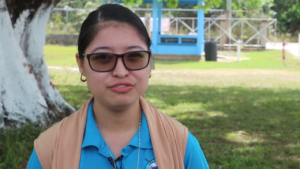
Gwendolin Correa
Gwendolin Correa, Teacher, King’s College
“Basically, the prompt was, how would we grow food on Mars? How can we make that a reality? And some research they did do, and it was very extensive because they had to learn about the food, food products, the energy source that they were going to do. How are they going to construct their greenhouse? In the end, they decided to do a film, a film to really engage other students and I would say viewers, because they didn’t want to do a regular PowerPoint presentation. They really wanted to make something entertaining, and this is where the film was born.”
This initiative stemmed from Pathlight International. Recognizing it as a valuable opportunity for exposure, Pedro Reyes, principal of King’s College, enthusiastically encouraged the students to take on the challenge.
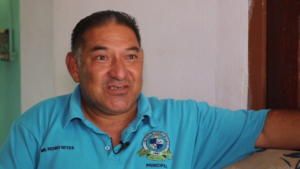
Pedro Reyes
Pedro Reyes, Principal, King’s College
“I introduced it to the teachers and asked, can we do this? They said definitely, let’s give it a try. It would be a wonderful experience and exposure for our students to learn. So, the teachers pulled a team of students, and the process of the project was really time consuming. Dedication, you know, the students spent a lot of time putting effort and interest into this project.”
Their sci-fi short film vividly portrays the futuristic tale of a scientist awakening from a comatose state in outer space. Upon regaining consciousness, he is greeted by his colleagues who share the many advancements made during his prolonged unconsciousness. The most profound revelation, they are now inhabitants of Mars. Ediel Reyes told us more.
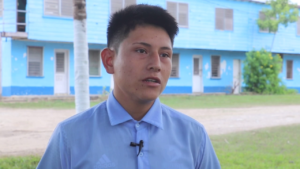
Ediel Reyes
Ediel Reyes, Student, King’s College
“It all came to the research. Each one of us had a certain part on my part about the structure of the greenhouse. You know, um, Making it good so that no, um, any contaminated oxygen or thing could affect us. And there were other parts that we’re talking about like. We talked about how long it would take to reach from Earth to Mars.That was basically a lot of information. Every evening we had to research a lot.”
Ithiel Reyes awakens from deep unconsciousness and learns of the developments.
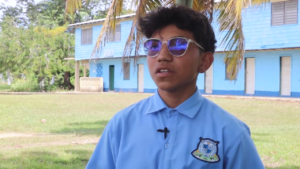
Ithiel Reyes
Ithiel Reyes, Student, King’s College
“I was having a hard time understanding what my colleagues were talking about. Um, this information, the technology and all this stuff there, once you’re waking up from a coma, you’re lost, right? And you don’t have, um, understanding your loss, and it was a very hard time. Processing all of this.”
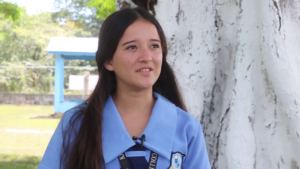
Johana Pineda
Johana Pineda, Student, King’s College
“So my role comes after the doctor. The doctor takes the coma boy to me and my role is to show him where we have our vegetables, the lettuce, the corn and we also had crickets.”
Yet, the question persists: can humanity adapt to inhabiting a world so markedly different from Earth, as we know it? The glaring differences in environmental conditions raise doubts about the human body’s resilience to such extremes. Nevertheless, it appears that the students have discovered an alternative.
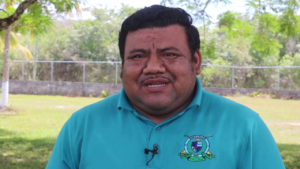
Hayyim Torres
Hayyim Torres, Teacher, King’s College
“The main film is just about a group of astronauts that went to Mars and they are going to be the first group to colonize Mars. They built an entire structure underground, not on the surface on Mars, but it is using lava tubes underground. With the research that we did, we actually found that there are gigantic lava tubes and all these structures, these greenhouses were built underground.”
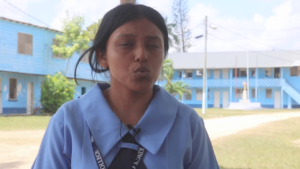
Jenny Perez
Jenny Perez, Student, King’s College
“I introduced the The nuclear energy source and how it is the main function and for what we will use it for, which will use it for the electricity and to use the water from Mars to get water from there and also for oxygen.”
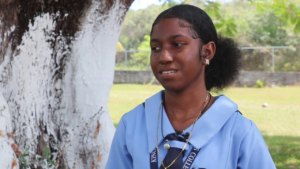
Abigail Pollard
Abigail Pollard, Student, King’s College
“Well, my research is that Mars is kind of challenging to grow food on the planet because the soil is very toxic and it’s about 4 percent of the soil that is very toxic to humans. So basically we had to like put a greenhouse on the ground and Since the planet, it has a very thin atmosphere. So in the night, it gets really cold for plants.”
According to King’s College, they did not imagine that the final product would have turned out so well. The students took full advantage of tech support by teaming up with a video production agency. And after eight weeks of grueling research and practicing their lines, these young researchers turned actors, have a final product to be proud of. According to Gwendolin Correa, all they could want is that the students learn while working together.
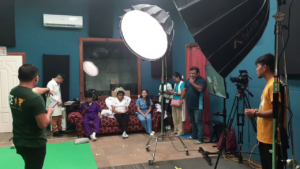 Gwendolin Correa
Gwendolin Correa
“I have to say I’m immensely proud of them and their work because they showed that they could apply several skills, not only the research skills, which is very important, but they were also able to collaborate with each other and communicate effectively. Because, you know, when communication doesn’t exist, then some Students might not be willing to do their part, but everyone in our group was able to have a week to be a leader. And all of them showed that they could be leaders and they could lead.”
Looking on the Bright Side, I’m Sabreena Daly.





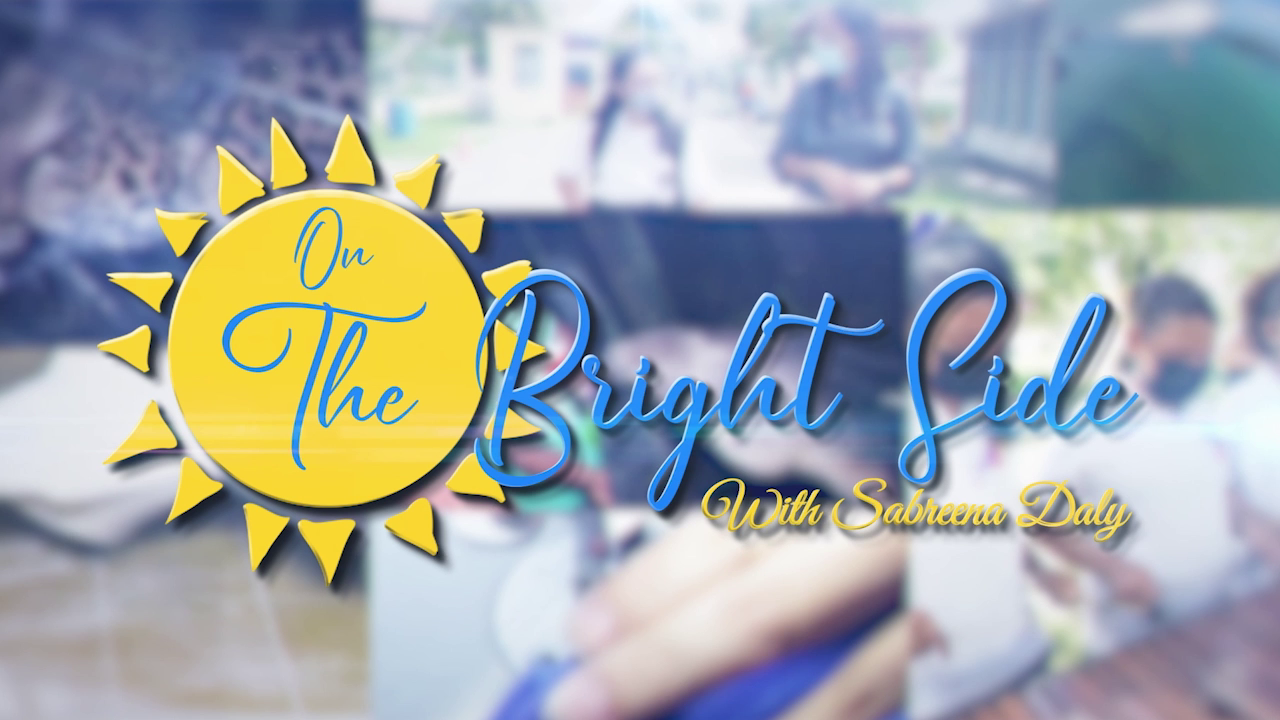
Facebook Comments